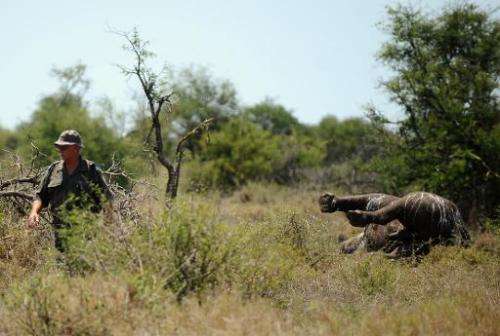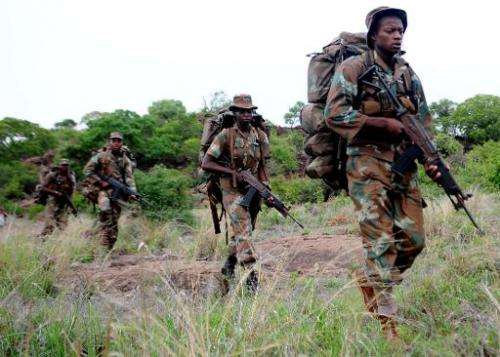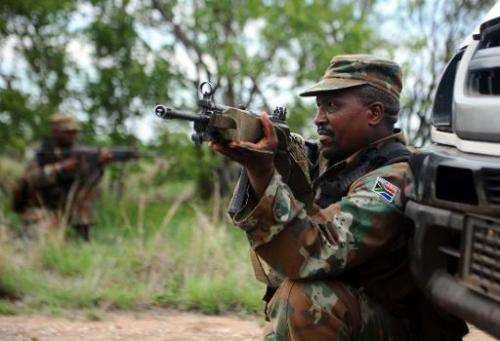No walk in the park for S. Africa's embattled game rangers

The game ranger with a rifle slung across his shoulders follows a bush trail through South Africa's famed Kruger national park, alert to the slightest sound or movement.
He faces threats not only from lions and elephants but from humans as well—heavily-armed poachers who stalk the park's wilderness day and night.
Rhino are their usual prey—they have killed 380 this year—but in an ominous sign of more trouble ahead the park announced Thursday that a second elephant had been killed for its tusks.
The vast park had been free of elephant poaching for more than a decade before the first one was shot and had its tusks hacked off in May.
Elephant tusks and rhino horns can fetch high prices, especially in Asia, and poachers are ready to battle to get them.
"Our lives are also at risk, because we stand in the way of what the poachers want," said veteran ranger Stephen Midzi.
"They are prepared to kill, and some are armed with AK 47 rifles."
Midzi is one of nearly 350 rangers who traverse the two million hectare (nearly five million acre) park on foot, checking for any signs of unusual activity.
"Our primary task is to protect all the animals and the ecosystem of the park, but the rhino is facing the biggest threat," he told AFP. The horns are mistakenly believed to have medicinal properties.
Rhino poaching jumped from 13 animals killed in 2007 to the slaughter of 1,004 last year mostly in the Kruger park, which is roughly the size of Wales.
Midzi leads a team of 16 rangers in charge of 90,000 hectares in the southern section of the park, where he says most rhino poaching occurs.
It's a job that requires alertness at the highest level and bush survival skills, where every spoor is inspected to detect the presence of invaders.

"It's not just a walk in the park," said Midzi.
"Anything can happen to you while you are out there, you are in danger from both the animals and human beings," he said, adding the latter posed the biggest danger.
With their green uniforms, rangers blend in with the thick vegetation in summer but in the dry winter months they can easily be spotted by poachers who are themselves well versed in bushcraft.
Gunfire is often exchanged between the rangers and poachers, Midzi said.
"The most dangerous time for us is during the period of full moon. Poachers take advantage of the clear nights and come out in large numbers."
'You feel like you've failed'
The ranger, with 16 years of experience in the bush, said coming across an animal which had been killed and hacked made him feel like he had failed in his duties.
"You feel like you have failed. It is not a good feeling," he said.
"You feel like you have let down the entire human race and the animal which you are supposed to protect."
South African National Parks spokesman Ike Phaahla said rangers played a crucial role even though there is new technology now being deployed to fight poaching.

"The rangers are still our most valuable asset. The people who are arrested in the park are caught by rangers," said Phaahla.
Kruger park rangers have arrested 69 poachers so far this year. One poacher caught after a shootout, in which one of his accomplices died, was jailed for 77 years last week.
Still, retired major general Johan Jooste, who was brought in to help train rangers into something of a paramilitary force, said further militarisation of the park was not a desirable solution.
"Over-militarising the park would take away the ambiance, and we don't want that," said Jooste.
But not all rangers in the park have demonstrated a noble commitment to protecting Africa's most prized heritage—some have themselves been implicated in poaching rings.
Three ex-rangers and two guides have been arrested for suspected rhino poaching, along with three policemen.
South Africa is believed to be home to around 80 percent of the world's rhino population, estimated at more than 25,000, but the numbers are falling fast.
For now men like Midzi, assisted with technology such as surveillance aircraft, are their last line of defence.
© 2014 AFP




















